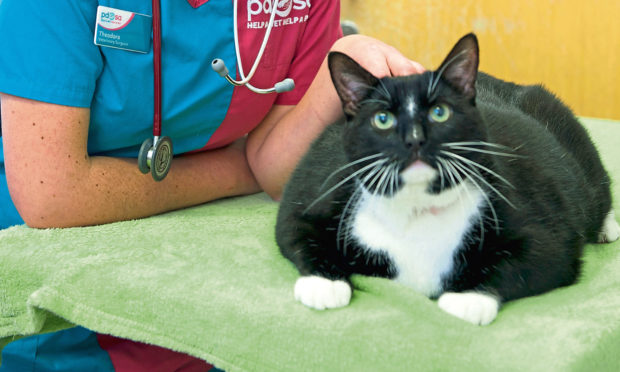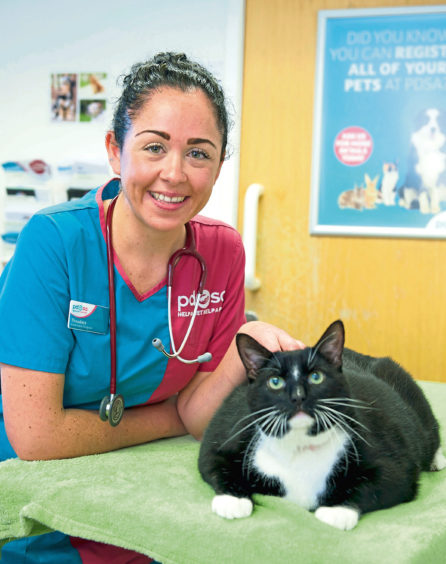A cat more than double its ideal weight is among the animals competing for a place in a pet slimming contest.
Ten-year-old Sox, from Dundee, tips the scales at 11kg (24lb), well above his ideal weight of 5kg (11lb), and now struggles to get up the stairs.
He is among the contenders for a place in vet charity PDSA’s Pet Fit Club competition, which sees up to 20 overweight pets including dogs, cats, rabbits and rats chosen to participate.
Selected pets are placed on a six-month diet and exercise programme, individually tailored to their needs and overseen by vets and nurses at their local PDSA pet hospital.
Sox’s owner Stephanie Cowan adopted him from a rescue centre when he was just a few weeks old.
She said: “Sox doesn’t have a massive appetite but his weight has gradually crept up over the years.
“When you see them every day it’s difficult to notice when they’re getting bigger, but we know that he’s a lot slower and less energetic than he was this time last year.
“Sox is an indoor cat and doesn’t get out much, so he doesn’t get much exercise and I am concerned about his increasing weight.
“We have another cat named Finn who has a massive appetite, but Finn weighs much less than Sox. I always measure their food portions out and try not to overfeed them, but I am worried and just want Sox to be healthy.
“Sox is such a huge part of our family. He has helped my daughter through some very difficult times in her life and we would be lost without him.”
PDSA vet Theodora Stefanou said: “Sox is quite a way off his ideal weight so we are obviously concerned about his health. It’s good that Stephanie recognises that he needs to lose weight and we are pleased that she has already made changes to his diet.
“She is committed to helping him and with the right support and choices, I’m confident that he will reach a healthy weight.”
Up to half of UK pets – 46% of dogs, 34% of cats and 30% of rabbits – are believed to be overweight or obese, according to PDSA figures.
The most common reasons for pets being overweight include owners not recognising their pet’s weight is an issue, feeding them too many treats or human food, and inappropriate portion sizes.
PDSA vet nurse Nina Downing said: “Pet obesity has been a huge problem in the UK for many years and sadly there is no sign of improvement, with nearly one in every two pets seen by vets and vet nurses overweight or obese.
“This is a serious health issue, one of the biggest currently threatening pet wellbeing across the UK.
“Pets who are overweight or obese are much more likely to develop health problems such as arthritis and diabetes.
“Prevention is always better than cure, but it is never too late to make a change.
“With the right advice, a good diet, suitable exercise and a bit of willpower, owners have the ability to make a real difference to their pet’s lives.”











